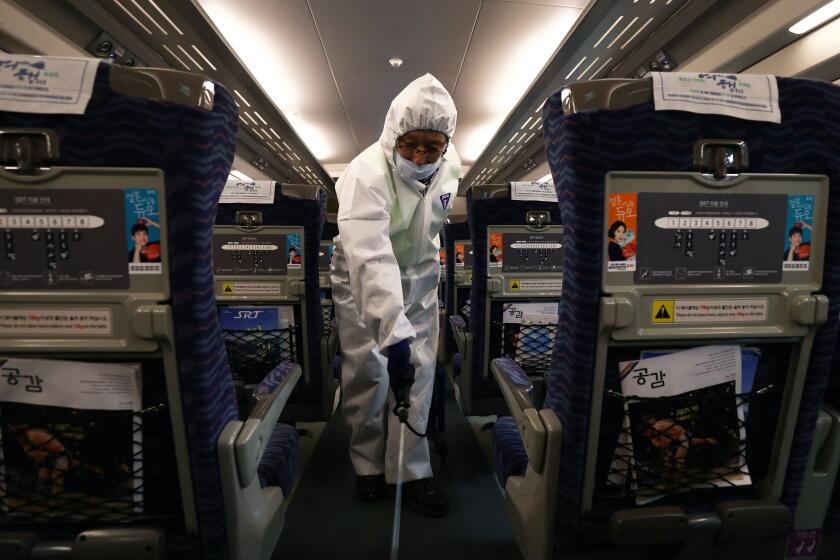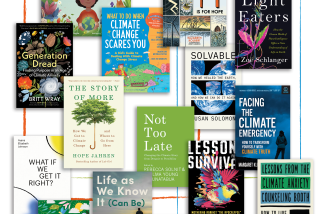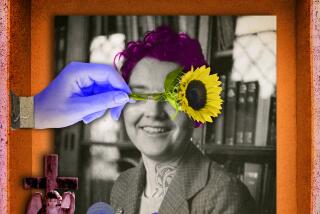Apocalypse, you say? Writer Mark O’Connell has been there, done that
A long, long time ago, in 2019, when Irish writer Mark O’Connell needed an epigraph for his new book, “Notes From an Apocalypse,” he chose one addressing what looked like (and might still be) the greatest looming threat to humanity. He quoted Swedish climate activist Greta Thunberg.
“I don’t want you to be hopeful,” Thunberg told the United Nations last year. “I want you to panic. I want you to feel the fear I feel every day. And then I want you to act. I want you to act as you would in a crisis. I want you to act as if the house is on fire. Because it is.”
Years ahead of Thunberg (and the coronavirus), O’Connell had started panicking not long after the birth of his son, in 2013. Then, prompted in part by the election of Donald Trump, he set out on a globe-spanning investigation into the world of preppers planning for TEOTWAWKI (the end of the world as we know it), when we are left WROL (without rule of law). It turns out that preppers, like the military, appreciate a good acronym.
The timing of this volume couldn’t be better, with each of us in our own private bunker, hoarding survival supplies and only venturing out in our homemade “Mad Max”-ish face masks to stand in the vicinity of Trader Joe’s, desperadoes one and all.
O’Connell’s previous book, “To Be a Machine,” focused on the obsession of Silicon Valley with transhumanism. He revisits California in his new book as well, this time focusing on Los Angeles, where he attends a meeting of people who hope to colonize Mars before SHTF (“stuff” hits the fan). His end-of-the-world tour also takes in prepper bunkers in South Dakota, billionaire Peter Thiel’s New Zealand hideaway, an Edenic settlement in Scotland and Ukraine’s Chernobyl Exclusion Zone.
But, as O’Connell made clear when reached by phone in his Dublin home, the journey he documented was as personal as it was global. Our conversation has been edited for clarity and length.
So, you just published a book about the end of the world in the middle of the closest thing we’ve seen to it. Dumb luck?
I finished the reporting for the book in 2018 and then took another year to wrestle it into shape, but yes, it is strange just how relevant it turned out to be. Honestly, in this book I really just wanted to explore my own anxieties, preoccupations and obsessions. And then I wanted people to come away with a sense of the peculiarity of our times. As you know, the apocalypse is not ever really far from our minds. I come from a place, Ireland, that has already experienced as close to a total apocalypse as any country on Earth, the potato famine. History never leaves us. It’s like that Joyce quote: History is the nightmare from which we are all trying to wake.
Why are we so obsessed with such stories?
We just love it. We love the apocalypse. When I told people what I was working on, they would say, “I love the apocalypse.” And in a really un-ironic way. When I was younger, I was really into Freud, and the entry point for me was an interest in what he calls “the death instinct.” I think it starts early in all of us. I got into a dialogue with my son about “The Lorax,” which is a kind of post-apocalyptic picture book about climate change. I think all writers at some level are drawn to channeling the death-seeking energies of the culture.
Governments and health officials around the world are trying to mitigate the spread of the coronavirus outbreak.
Nearly all the preppers you meet are white men, and you point out that they seem fixated on race.
True, prepping is an overwhelmingly white, male milieu. What really shook me, and I could not ignore, was just how racially encoded their anxieties were and how much they were focused on clichés of urban black populations turning to civil unrest, particularly in their WROL fantasies.
There is almost a frontier colonialist cast to their thinking.
I talk about that in the chapter on the meeting I attended with people who want to colonize Mars — the idea that a certain class of people can insulate themselves by either moving to another planet or by trying to establish a post-technological utopia, like in Alladale [Wilderness Reserve in the Scottish Highlands].
The book begins with your son watching cartoons while you glimpse a dying bear on YouTube, and it ends with you reading your wife the news of insect civilizations collapsing while she breastfeeds your daughter. Did you write this for your children?
I used to fear that it was morally wrong to have children in the first place. But I am no longer agonizing over that. The emotional and intellectual engine of the book is the sense of cognitive dissonance that arises between my private life as a man with children — and the need to inculcate them with the belief that the world is a beautiful place — and what you read when opening a newspaper or looking at Twitter. It’s really hard to keep a balance between those two competing narratives, but that is what I try to do.
Is that why you keep returning to the image of people dancing — sometimes to the music in their own heads? It crops up randomly several times in the book.
It may be more literary than journalistic in intent. There’s an image of a kid headbanging and shredding air guitar on the street in South Dakota, and the old man bouncing up and down outside the gas station in Los Angeles holding a cross, or even my young daughter dancing when I play her music. They all resonate as a kind of rapture or ecstasy. For me, it was like going into a fugue state.
It’s unexpected and, to be honest, seems discordant.
I’m hugely influenced by movies. I’m a big fan of Werner Herzog and his dancing chickens and breakdancing ghosts. And the films of Claire Denis. My favorite moment of any film is the ending of “Beau Travail,” with Denis Lavant dancing to Europop in a nightclub. It is so hypnotic and strange. It seemed important to me to have moments in the project that seemed volatile and inexplicable as well.
California has always seemed poised on the edge of the abyss. Does it have a special relationship with the idea of the apocalypse?
My first memory of California is of the L.A. riots in 1992, which was a very dystopian scene. I still cannot visit Los Angeles without thinking of “The Terminator” and my favorite apocalypse movie of all time, “Miracle Mile.” But it all makes sense in a way: California is the literal end of America, the apotheosis of the country. And the thing is that it is a very Californian thing to maintain an absolute, resolute refusal to die. So ultimately, when it comes to California, the apocalypse serves as a useful metaphor, a way of metabolizing our uncertainty about the future, the foreboding. But, as we know, the thing about the apocalypse or the end of the world is it’s never really the end. History has proven to us the world will go on. Even now. It just will.
Nawotka is the bookselling and international editor of Publishers Weekly.
More to Read
Sign up for our Book Club newsletter
Get the latest news, events and more from the Los Angeles Times Book Club, and help us get L.A. reading and talking.
You may occasionally receive promotional content from the Los Angeles Times.









